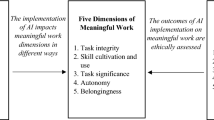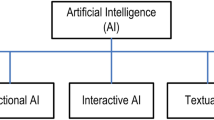Abstract
Recently, researchers on organization theory and behavior were challenged by the introduction of cognitive machines in the list of the organization’s participants. Researchers in this field advocated that cognitive machines contribute to improve cognitive abilities in the organization by extending people’s rationality and decision-making capacity and by reducing intra-individual and group dysfunctional conflicts. This paper supports these findings and extends their results to upper layers at managerial and organizational levels of application by proposing the concept of new industrial organizations with structure and processes of Computational Organization Management Networks. In such a new organization type, cognitive machines and cognitive information systems are prominent actors of governance, automation, and control of the whole enterprise.






Similar content being viewed by others
References
Bradshaw JM (1997) Software agents. AAAI Press, Menlo Park
Hart SL (1997) Beyond greening: strategies for a sustainable world. Harv Bus Rev 75(1):67–76
ITU-T (2000) Principles for a telecommunications management network. ITU-T Recommendation M.3010, International Telecommunication Union. United Nations specialized agency for information and communication technologies, Geneva
Kusiak A (2000) Computational intelligence in design and manufacturing. Wiley, New Jersey
Lee GH (1998) Designs of components and manufacturing systems for agile manufacturing. Int J Prod Res 4(36):1023–1044
London T, Hart SL (2011) Next generation business strategies for the base of the pyramid: new approaches for building mutual value. Pearson Education, New Jersey
Monfared MAS, Steiner SJ (1997) Emerging intelligent manufacturing systems. Int J Flex Autom Integr Manuf 5:151–170
Nobre FS (2011) Core competencies of the new industrial organization. J Manuf Technol Manag 22(4):422–443 ISSN: 1741-038X
Nobre FS, Walker D (2011a) An ability-based view of the organization: strategic-resource and contingency domains. Learn Org 18(4):333–345 ISSN:0969-6474
Nobre FS, Walker D (2011b) A dynamic ability-based view of the organization. Int J Knowl Manag 7(2):86–101 ISSN:1548-0666
Nobre FS, Tobias AM, Walker DS (2009a) Organizational and technological implications of cognitive machines: designing future information management systems. IGI Global, NY, USA. ISBN: 978-1-60566-302-9
Nobre FS, Tobias AM, Walker D (2009b) The impact of cognitive machines in complex decisions and organizational change. J AI Soc 24(4):365–381
Nobre FS, Tobias AM, Walker D (2010) A new contingency view of the organization: managing complexity and uncertainty through cognition. Braz Adm Rev 7(4):379–396 ISSN:1807-7692
Pine BJ (1999) Mass customization: The new frontier in business competition. Harvard Business School, London
Prahalad CK (2004) The fortune at the bottom of the pyramid. Wharton School Publishing, USA
Prahalad CK, Hart SL (2002) The fortune at the bottom of the pyramid. Strategy Bus 26(First Quarter): 2–14
Rao M et al (1993) Integrated distributed intelligent systems in manufacturing. Chapman & Hall, New York
Toni A, Tonchia S (1998) Manufacturing flexibility: a literature review. Int J Prod Res 6(36):1587–1617
Watt SNK (1997) Artificial societies and psychological agents. In: Nwana S, Azarmi N (eds) Software agents and soft computing: towards enhancing machine intelligence. Springer, Berlin, pp 27–41
Wu B (1994) Manufacturing systems design and analysis: context and techniques, 2nd edn. Chapman & Hall, New York
Zadeh LA (1973) Outline of a new approach to the analysis of complex systems and decision process. IEEE Trans Syst Man Cybern 3(1):28–44
Zadeh LA (1994) Soft computing and fuzzy logic. IEEE Softw 11(1–6):48–56
Zadeh LA (1999) From computing with numbers to computing with words—from manipulation of measurements to manipulation of perceptions. IEEE Trans Circuits Syst 45(1):105–119
Zadeh LA (2001) A new direction in AI: toward a computational theory of perceptions. AI Mag 22(1):73–84
Author information
Authors and Affiliations
Corresponding author
Rights and permissions
About this article
Cite this article
Nobre, F.S. Governing industrial organizations through cognitive machines. AI & Soc 27, 501–507 (2012). https://doi.org/10.1007/s00146-011-0364-0
Received:
Accepted:
Published:
Issue Date:
DOI: https://doi.org/10.1007/s00146-011-0364-0




